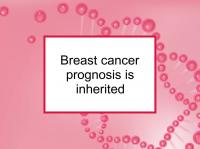A new study has reported that breast cancer patients with mothers or sisters who die of breast cancer are almost five times more likely to die than those with mothers or sisters who survive. Previous studies have reported similar survival outcomes among first degree relatives, suggesting a heritable component.
The study was designed to investigate whether survival among breast cancer patients with a mother or sister with breast cancer is explained by shared patient and tumor characteristics or type of treatment, while adjusting for patient and tumor characteristics and type of treatment.
To conduct the study, the authors identified 162 first degree relative pairs diagnosed with breast cancer in the Geneva Breast Cancer Registry. Women were categorized into poor, medium, and good survival risk groups according to the breast cancer-specific survival of their mothers or sisters.
Patient, tumor, and treatment characteristics were compared between categories and standardized mortality ratios (the ratio of actual deaths to expected deaths) and adjusted disease-specific mortality were calculated for each group.
Women in the poor familial survival risk group (whose mothers or sisters died from breast cancer) were found to be more likely to be diagnosed at later stages than those in the good familial survival risk group. Similarly, these women had higher standardized mortality ratios than those in the medium and good survival risk groups and they were almost five times as likely to die from breast cancer.
The authors conclude that breast cancer prognosis runs in families and suggests that the hereditary component is independent of patient and tumor characteristics and type of treatment.
